Expedite your nonfiction book discovery process with Readara interviews, summaries and recommendations, Broaden your knowledge and gain insights from leading experts and scholars
In-depth, hour-long interviews with notable nonfiction authors, Gain new perspectives and ideas from the writer’s expertise and research, Valuable resource for readers and researchers
Optimize your book discovery process, Four-to eight-page summaries prepared by subject matter experts, Quickly review the book’s central messages and range of content
Books are handpicked covering a wide range of important categories and topics, Selected authors are subject experts, field professionals, or distinguished academics
Our editorial team includes books offering insights, unique views and researched-narratives in categories, Trade shows and book fairs, Book signings and in person author talks,Webinars and online events
Connect with editors and designers,Discover PR & marketing services providers, Source printers and related service providers

Against the Grain: A Deep History of the Earliest States
History > Civilization
- Yale University Press
- Paperback
- 9780300240214
- 8.2 X 5.5 X 0.9 inches
- 0.76 pounds
- History > Civilization
- (Single Author) Asian American
- English
Readara.com
Book Description
History as it should be written.--Barry Cunliffe, Guardian
Scott hits the nail squarely on the head by exposing the staggering price our ancestors paid for civilization and political order.--Walter Scheidel, Financial Times
Why did humans abandon hunting and gathering for sedentary communities dependent on livestock and cereal grains, and governed by precursors of today's states? Most people believe that plant and animal domestication allowed humans, finally, to settle down and form agricultural villages, towns, and states, which made possible civilization, law, public order, and a presumably secure way of living. But archaeological and historical evidence challenges this narrative. The first agrarian states, says James C. Scott, were born of accumulations of domestications: first fire, then plants, livestock, subjects of the state, captives, and finally women in the patriarchal family--all of which can be viewed as a way of gaining control over reproduction.
Scott explores why we avoided sedentism and plow agriculture, the advantages of mobile subsistence, the unforeseeable disease epidemics arising from crowding plants, animals, and grain, and why all early states are based on millets and cereal grains and unfree labor. He also discusses the barbarians who long evaded state control, as a way of understanding continuing tension between states and nonsubject peoples.
Author Bio
James Scott, Ph.D., Yale University, 1967, is the Sterling Professor of Political Science and Professor of Anthropology and is co-Director of the Agrarian Studies Program and a mediocre farmer. His research concerns political economy, comparative agrarian societies, theories of hegemony and resistance, peasant politics, revolution, Southeast Asia, theories of class relations and anarchism.
His publications include
- Domination and the Arts of Resistance, Yale Press, 1985
- Weapons of the Weak: Everyday Forms of Peasant Resistance, Yale Press 1980
- Seeing Like a State: How Certain Schemes to Improve the Human Condition Have Failed, Yale Press, 1998
- The Art of Not Being Governed: An Anarchist History of Upland Southeast Asia, Yale Press, 2008
- Two Cheers for Anarchism, Princeton Press, 2013
- Against the Grain: A Deep History of the Earliest Agrarian States, Yale Press, 2017
Education
1954-58 B.A. Williams College, Political Economy
1958-59 auditor Rangoon University, Burma; Economics
1959-60 auditeur, Institut des Sciences Politiques, Paris; Political Science
1961-63 M.A. Yale University; Political Science
1963-67 Ph.D. Yale University; Political Science
Source: Yale University
Videos
No Videos
Community reviews
No Community reviews

